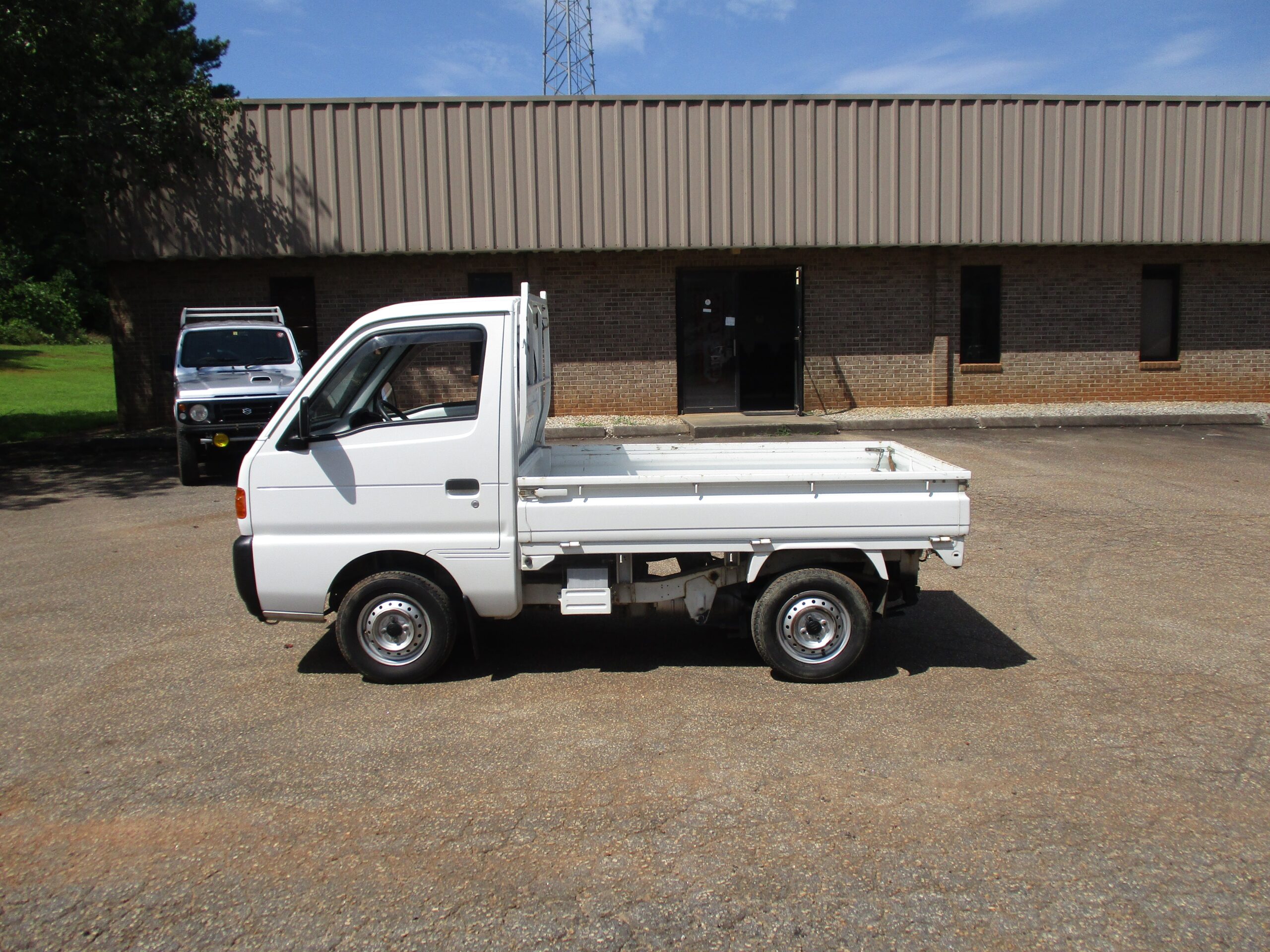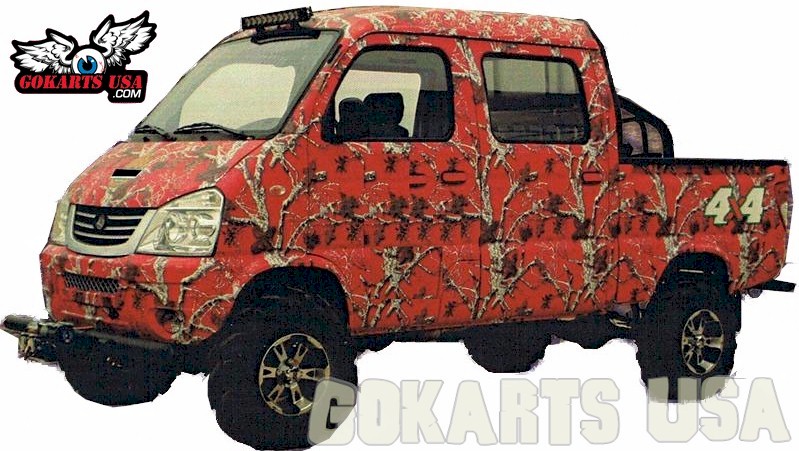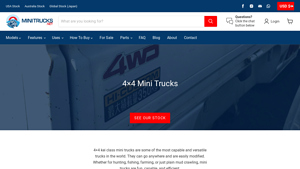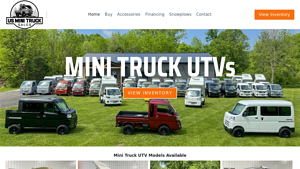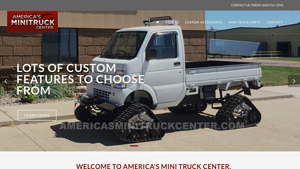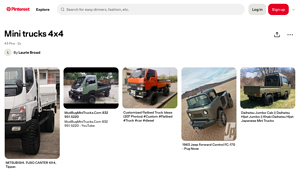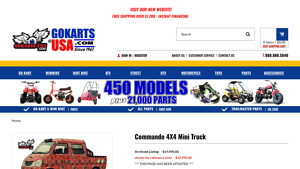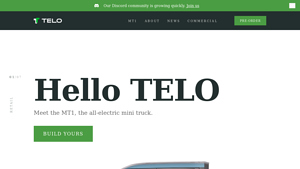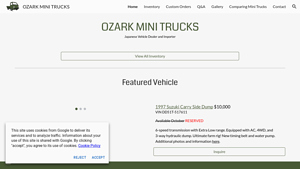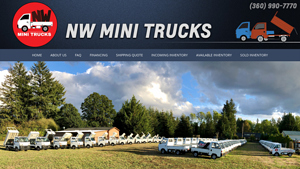Introduction: Navigating the Global Market for mini truck 4×4
In today’s competitive landscape, sourcing reliable mini truck 4×4 vehicles can be a daunting challenge for international B2B buyers. These versatile vehicles, ideal for a range of applications from agriculture to urban logistics, require careful consideration of various factors, including performance, adaptability, and supplier credibility. This comprehensive guide delves into the intricacies of the global mini truck market, offering insights into different types of vehicles, their applications, and essential criteria for vetting suppliers.
Buyers from Africa, South America, the Middle East, and Europe, including key markets like Nigeria and Germany, will find actionable information to navigate this complex market effectively. The guide covers critical aspects such as cost analysis, customization options, maintenance considerations, and the importance of understanding regional regulations. By empowering buyers with the knowledge to make informed purchasing decisions, this resource aims to streamline the acquisition process and enhance operational efficiency.
With the right information at their fingertips, businesses can leverage the unique advantages of mini truck 4×4 vehicles, ensuring they select the best options tailored to their specific needs while optimizing their investment in these robust vehicles.
Understanding mini truck 4×4 Types and Variations
| Type Name | Key Distinguishing Features | Primary B2B Applications | Brief Pros & Cons for Buyers |
|---|---|---|---|
| Standard 4×4 Mini Truck | Compact size, 4WD capability, versatile payload options | Agriculture, Construction, Landscaping | Pros: Excellent maneuverability; Cons: Limited cargo space compared to larger trucks. |
| Dump Mini Truck | Hydraulic dump bed, high payload capacity | Waste management, Material transport, Farming | Pros: Efficient for loading/unloading; Cons: Heavier and may require more maintenance. |
| Crew Cab Mini Truck | Extended seating capacity, multiple configurations | Transportation, Event logistics, Municipal use | Pros: Increased passenger capacity; Cons: Larger footprint may limit access to tight areas. |
| Utility Mini Truck | Customizable features, specialized attachments | Utility work, Maintenance services, Emergency response | Pros: Highly adaptable for various tasks; Cons: Customization can increase upfront costs. |
| Recreational Mini Truck | Off-road capabilities, enhanced suspension systems | Outdoor activities, Hunting, Fishing | Pros: Great for rugged terrains; Cons: May lack commercial-grade durability for heavy loads. |
What are the Key Characteristics of Standard 4×4 Mini Trucks?
Standard 4×4 mini trucks are designed for versatility and maneuverability, making them ideal for various applications in agriculture, construction, and landscaping. Their compact size allows them to navigate narrow trails and tight job sites, while the four-wheel-drive system provides enhanced traction on challenging terrains. B2B buyers should consider their payload capacity and engine reliability, as these factors significantly influence operational efficiency.
How Do Dump Mini Trucks Enhance Operational Efficiency?
Dump mini trucks feature a hydraulic dump bed, which facilitates quick unloading of materials, making them indispensable for waste management and farming operations. Their high payload capacity allows for efficient transport of heavy loads, while their 4WD capability ensures they can handle rough terrains. Buyers should evaluate the maintenance requirements and weight limitations to ensure these trucks meet their specific operational needs.
What Advantages Do Crew Cab Mini Trucks Offer for Transportation?
Crew cab mini trucks provide extended seating capacity, accommodating more passengers than standard models. This feature is particularly valuable for transportation in municipal services or event logistics. The adaptability of crew cabs allows businesses to shift between passenger and cargo configurations easily. However, potential buyers should note that their larger size may restrict access to tighter spaces.
Why Choose Utility Mini Trucks for Versatile Operations?
Utility mini trucks are highly customizable, allowing businesses to equip them with specialized attachments for various tasks, such as maintenance or emergency response. Their adaptability makes them suitable for a wide range of industries, from utilities to construction. Buyers should weigh the benefits of customization against potential increases in upfront costs and ensure that the selected features align with their operational requirements.
What Makes Recreational Mini Trucks Ideal for Outdoor Activities?
Recreational mini trucks are built for off-road capabilities, featuring enhanced suspension systems that allow them to traverse rugged terrains effectively. They are perfect for outdoor activities such as hunting and fishing, where accessibility is crucial. B2B buyers should consider the durability and maintenance aspects, as these vehicles may not be designed for heavy commercial use but excel in leisure applications.
Key Industrial Applications of mini truck 4×4
| Industry/Sector | Specific Application of mini truck 4×4 | Value/Benefit for the Business | Key Sourcing Considerations for this Application |
|---|---|---|---|
| Agriculture | Crop Transport and Livestock Hauling | Efficient transport in rugged terrains, reducing labor costs and time. | Ensure payload capacity meets specific farming needs; consider local regulations for vehicle modifications. |
| Construction | Site Material Transport | Maneuverability in tight spaces, quick transport of tools and materials. | Look for models with durable builds and high payload capacities; assess availability of spare parts locally. |
| Municipal Services | Waste Collection and Maintenance | Compact size allows access to narrow streets; enhances operational efficiency. | Check for compliance with local environmental regulations; consider customization options for specific municipal needs. |
| Outdoor Recreation & Tourism | Shuttle Services for Tourists | Versatile and reliable for rugged terrains, enhancing customer experience. | Evaluate options for customization to suit tourism activities; consider regional climate impacts on vehicle performance. |
| Forestry | Timber Transport and Site Access | Ability to navigate forested areas, reducing damage to the environment. | Assess the vehicle’s off-road capabilities; ensure compatibility with forestry regulations and safety standards. |
How Are Mini Truck 4x4s Used in Agriculture?
In the agricultural sector, mini truck 4x4s are invaluable for transporting crops and livestock across challenging terrains. Their compact size allows farmers to navigate narrow paths between fields, minimizing crop damage while maximizing efficiency. These trucks can handle significant payloads, which is essential during harvest seasons. International buyers, particularly from regions like Africa and South America, should consider models with high reliability and easy access to spare parts, ensuring minimal downtime during critical agricultural periods.
What Role Do Mini Truck 4x4s Play in Construction?
In construction, mini truck 4x4s serve as agile transport solutions for materials and tools on site. Their ability to maneuver in tight spaces makes them ideal for urban construction projects or smaller job sites where larger vehicles cannot access. They help streamline operations by reducing the time taken to transport materials, thus improving overall project timelines. Buyers in Europe and the Middle East should prioritize trucks with robust build quality and high payload capacities to meet the demands of construction activities.
Why Are Mini Truck 4x4s Essential for Municipal Services?
Municipalities utilize mini truck 4x4s for tasks such as waste collection and maintenance of public spaces. Their compact dimensions allow access to narrow streets and crowded areas, enhancing operational efficiency. Additionally, their off-road capabilities enable them to handle various terrains, ensuring consistent service across different environments. Buyers should consider models that comply with local environmental regulations and explore customization options for specific municipal applications.
How Are Mini Truck 4x4s Beneficial for Outdoor Recreation and Tourism?
In the tourism sector, mini truck 4x4s are used for shuttle services, providing reliable transportation for tourists in rugged terrains. Their versatility allows them to adapt to various recreational activities, from wildlife tours to adventure sports. This enhances the overall tourist experience and encourages repeat visits. Buyers from tourist-heavy regions should evaluate customization options that cater to specific activities and assess the vehicle’s performance in local climate conditions.
What Advantages Do Mini Truck 4x4s Offer in Forestry?
Forestry operations benefit significantly from mini truck 4x4s, which are designed to navigate challenging forest terrains while minimizing environmental impact. These vehicles are essential for transporting timber and accessing remote sites without causing damage to the landscape. Buyers in this sector should focus on models with excellent off-road capabilities and ensure they meet local forestry regulations for safety and environmental compliance.
3 Common User Pain Points for ‘mini truck 4×4’ & Their Solutions
Scenario 1: Navigating Off-Road Challenges with Mini Trucks
The Problem: For businesses in sectors such as agriculture and construction, the ability to traverse rugged terrain is essential. However, many B2B buyers struggle with the limitations of standard vehicles when it comes to off-road capabilities. Mini trucks, while compact and maneuverable, can present challenges such as insufficient ground clearance and traction on uneven surfaces. These limitations can lead to inefficiencies in operations, increased downtime, and even damage to the vehicles.
The Solution: To effectively address off-road challenges, B2B buyers should prioritize sourcing mini trucks equipped with advanced features such as locking differentials and enhanced suspension systems. When selecting a model, consider investing in aftermarket modifications like lift kits, which provide additional ground clearance and improve the vehicle’s ability to navigate obstacles. Additionally, opting for mini trucks with all-terrain tires can greatly enhance traction. It’s advisable to consult with suppliers who specialize in custom configurations, ensuring that the chosen vehicle meets the specific demands of your operational environment.
Scenario 2: Ensuring Reliability for Remote Operations
The Problem: Businesses that operate in remote areas often face reliability issues with their vehicles. Mini trucks are celebrated for their fuel efficiency and compact size, but they can be vulnerable to breakdowns if not properly maintained. B2B buyers are particularly concerned about the availability of parts and services in isolated locations, which can lead to costly delays and hinder productivity.
The Solution: To mitigate reliability concerns, B2B buyers should conduct thorough research on the parts availability for the specific mini truck models they are considering. Japanese mini trucks, such as those from Daihatsu and Suzuki, typically have a robust parts network, which can be advantageous for maintenance. Establishing relationships with local dealers who can provide timely service and parts is essential. Additionally, consider investing in a preventative maintenance program that includes regular inspections and servicing, ensuring that the vehicles remain in optimal condition, thereby minimizing the risk of unexpected breakdowns.
Scenario 3: Maximizing Payload and Utility for Diverse Applications
The Problem: Many businesses need mini trucks that can adapt to a variety of tasks, from transporting goods to performing specialized functions like dumping or towing. B2B buyers often find that standard mini truck models may not have the payload capacity or utility features necessary for their specific needs, leading to suboptimal performance and unmet operational requirements.
The Solution: To maximize the utility of mini trucks, B2B buyers should explore customizable options available from reputable suppliers. Look for models with flexible payload capabilities, such as those equipped with hydraulic dump beds or adjustable towing features. When engaging with suppliers, clearly communicate your intended applications to ensure they recommend models that suit your operational demands. Additionally, consider investing in accessories like plows or racks that can enhance the functionality of the mini truck for various tasks, ensuring that it serves multiple purposes and provides a higher return on investment.
Strategic Material Selection Guide for mini truck 4×4
What Are the Key Materials Used in Mini Truck 4×4 Manufacturing?
When selecting materials for mini truck 4×4 applications, it is essential to consider properties that directly impact performance, durability, and cost-effectiveness. Below are analyses of four common materials used in the construction of these vehicles, focusing on their key properties, advantages, disadvantages, and implications for international buyers.
Steel: The Backbone of Mini Truck Structures
Key Properties:
Steel is known for its high strength-to-weight ratio and excellent durability. It typically boasts a temperature rating of up to 400°C and offers good resistance to deformation under pressure.
Pros & Cons:
Steel is relatively inexpensive and widely available, making it a popular choice for frames and structural components. However, it is prone to corrosion if not properly treated, which can be a significant drawback in humid or coastal environments.
Impact on Application:
Steel’s robustness makes it suitable for heavy-duty applications, such as carrying loads in farming or construction. However, its weight can impact fuel efficiency, which is a critical consideration for end-users.
Considerations for International Buyers:
Buyers in regions like Africa and South America should ensure compliance with local corrosion resistance standards, as well as ASTM or DIN specifications for structural integrity.
Aluminum: Lightweight and Corrosion-Resistant
Key Properties:
Aluminum is lightweight, with a density of about one-third that of steel. It has excellent corrosion resistance and can withstand temperatures up to 600°C without significant degradation.
Pros & Cons:
The primary advantage of aluminum is its weight-saving properties, which can enhance fuel efficiency and payload capacity. However, it is generally more expensive than steel and can be less durable under heavy stress.
Impact on Application:
Aluminum is ideal for components where weight reduction is crucial, such as body panels and certain engine components. Its corrosion resistance makes it suitable for applications in coastal or humid regions.
Considerations for International Buyers:
European buyers, particularly in Germany, may prefer aluminum for its lightweight properties and compliance with stringent environmental standards. Understanding local recycling regulations is also essential for sustainability.
Composite Materials: The Future of Lightweight Engineering
Key Properties:
Composites, such as fiberglass and carbon fiber, offer high strength while being significantly lighter than metals. They can endure a wide range of temperatures and are often engineered for specific applications.
Pros & Cons:
The major advantage of composites is their weight-saving potential and corrosion resistance. However, they can be costly and may require specialized manufacturing processes, which can complicate supply chains.
Impact on Application:
Composites are often used in high-performance components, such as bodywork and interior parts, where weight savings and aesthetics are important. Their application can significantly enhance fuel efficiency and performance.
Considerations for International Buyers:
Buyers must consider the availability of composite materials and manufacturing capabilities in their regions. Compliance with international standards such as JIS for composites is crucial for quality assurance.
Rubber: Essential for Suspension and Sealing
Key Properties:
Rubber is flexible and resilient, with excellent shock-absorbing properties. It performs well under a range of temperatures but can degrade under extreme UV exposure.
Pros & Cons:
Rubber is cost-effective and provides excellent sealing and vibration-dampening capabilities. However, its lifespan can be limited, particularly in harsh environments.
Impact on Application:
Rubber is essential for suspension components and weather seals, which are critical for maintaining vehicle performance and comfort.
Considerations for International Buyers:
In regions like the Middle East, where UV exposure is high, buyers should ensure that rubber components meet specific durability standards to withstand local conditions.
Summary Table of Material Selection for Mini Truck 4×4
| Material | Typical Use Case for mini truck 4×4 | Key Advantage | Key Disadvantage/Limitation | Relative Cost (Low/Med/High) |
|---|---|---|---|---|
| Steel | Structural components | High strength and durability | Prone to corrosion | Low |
| Aluminum | Body panels and engine components | Lightweight and corrosion-resistant | Higher cost | Medium |
| Composite | High-performance bodywork | Significant weight savings | Expensive and complex to manufacture | High |
| Rubber | Suspension and sealing | Excellent shock absorption | Limited lifespan in harsh conditions | Low |
This strategic material selection guide aims to equip international B2B buyers with the knowledge needed to make informed decisions regarding the materials used in mini truck 4×4 applications, ensuring optimal performance and compliance with local standards.
In-depth Look: Manufacturing Processes and Quality Assurance for mini truck 4×4
What Are the Main Stages of Manufacturing Processes for Mini Truck 4×4?
The manufacturing of mini truck 4×4 vehicles involves a series of well-defined stages, each critical to ensuring the final product meets the expected performance and quality standards. The primary stages include material preparation, forming, assembly, and finishing.
Material Preparation: This stage begins with the selection of high-grade materials suitable for the demanding conditions in which mini trucks operate. Steel and aluminum are commonly used due to their strength-to-weight ratio. Materials undergo rigorous testing to ensure they meet specific mechanical properties and standards.
Forming: In this phase, raw materials are transformed into components. Techniques such as stamping, bending, and forging are employed to create parts like the chassis, body panels, and suspension systems. Advanced machinery, including CNC machines, ensures precision in forming components, which is essential for maintaining the structural integrity of the vehicle.
Assembly: This is a critical stage where various components are brought together. Automated assembly lines are often utilized, allowing for efficient and consistent construction. Key parts, such as the engine, transmission, and 4WD systems, are integrated during this phase. Skilled technicians perform manual assembly for complex components to ensure proper fit and functionality.
Finishing: The final stage involves surface treatment, painting, and quality checks. Techniques like powder coating and galvanization are employed to enhance corrosion resistance, particularly important for vehicles expected to operate in harsh environments. Final inspections ensure that each mini truck meets the manufacturer’s specifications and is ready for delivery.
How is Quality Assurance Implemented in Mini Truck 4×4 Manufacturing?
Quality assurance (QA) is a cornerstone of the manufacturing process for mini truck 4×4 vehicles, ensuring that products are reliable, safe, and meet customer expectations. Various international and industry-specific standards guide these processes.
Relevant International Standards: The ISO 9001 certification is the most recognized quality management system standard. It emphasizes a process-based approach to ensuring consistent quality. Other standards, such as CE marking for compliance with European safety and environmental regulations, are also crucial for international buyers.
Industry-Specific Standards: In addition to ISO certifications, mini truck manufacturers may adhere to standards specific to the automotive industry, such as the Automotive Product Quality (APQ) standards. These standards often focus on parts and assembly quality, ensuring that every component meets rigorous safety and performance criteria.
What Are the Key Quality Control Checkpoints in Mini Truck Manufacturing?
Quality control (QC) checkpoints are vital throughout the manufacturing process to ensure that every mini truck 4×4 meets quality standards. These checkpoints can be categorized into three main areas: Incoming Quality Control (IQC), In-Process Quality Control (IPQC), and Final Quality Control (FQC).
Incoming Quality Control (IQC): This stage involves inspecting raw materials and components before they are used in production. Suppliers must provide documentation and certificates of compliance for the materials, which are then tested for specifications such as tensile strength and fatigue resistance.
In-Process Quality Control (IPQC): As manufacturing progresses, various checkpoints are established to monitor the quality of assembly and manufacturing processes. This includes verifying the accuracy of machine settings, the quality of welds, and the functionality of components as they are assembled. Regular audits during this stage help identify any deviations from the production standards.
Final Quality Control (FQC): Before the mini trucks are dispatched, they undergo a comprehensive final inspection. This includes road tests, safety checks, and performance evaluations to ensure that they meet all operational standards. Documentation of these tests is crucial for transparency and trust, especially for international buyers.
How Can B2B Buyers Verify Supplier Quality Control Processes?
For B2B buyers, especially those in Africa, South America, the Middle East, and Europe, verifying a supplier’s quality control processes is critical for ensuring product reliability. Several strategies can be employed:
Supplier Audits: Conducting regular audits of suppliers is an effective way to assess their quality control practices. This involves evaluating their manufacturing processes, quality management systems, and compliance with international standards.
Quality Reports: Requesting detailed quality reports can provide insights into a supplier’s QC practices. These reports should include data on IQC, IPQC, and FQC results, along with any corrective actions taken for identified issues.
Third-Party Inspections: Engaging third-party inspection services can add an additional layer of assurance. These services can conduct independent assessments of the manufacturing facilities and processes, providing unbiased evaluations of quality control measures.
What Are the QC and Certification Nuances for International B2B Buyers?
International B2B buyers must navigate various nuances in quality control and certification when sourcing mini truck 4x4s. Understanding regional standards and compliance requirements is essential for successful procurement.
Regional Standards Compliance: Different regions may have specific regulations that affect the certification and quality assurance processes. For example, European buyers may require CE certification, while buyers in the Middle East may need to adhere to local automotive standards.
Import Regulations: Buyers must also be aware of import regulations that could affect their ability to bring mini trucks into their countries. This includes compliance with emissions standards, safety regulations, and any specific documentation required by customs authorities.
Warranty and Support Considerations: When selecting suppliers, buyers should consider the warranty terms and after-sales support offered. A robust warranty can indicate a manufacturer’s confidence in their QC processes and product durability, providing peace of mind for international buyers.
By focusing on these detailed manufacturing processes and quality assurance strategies, B2B buyers can make informed decisions when sourcing mini truck 4×4 vehicles, ensuring they invest in reliable and high-quality products.
Practical Sourcing Guide: A Step-by-Step Checklist for ‘mini truck 4×4’
To assist B2B buyers in procuring mini truck 4×4 vehicles, this guide outlines a practical checklist designed to streamline the sourcing process. Mini trucks are versatile assets for various industries, from agriculture to construction, and understanding the procurement steps is crucial for successful acquisition.
Step 1: Define Your Technical Specifications
Clearly outline your requirements for the mini truck 4×4, considering factors like load capacity, dimensions, and engine type. This step is vital to ensure that the vehicles meet your operational needs and that you avoid unnecessary modifications post-purchase. Think about the specific terrain and use cases—whether for off-roading, farming, or urban transport.
Step 2: Research Reputable Suppliers
Conduct thorough research to identify reliable suppliers specializing in mini truck 4x4s. Look for suppliers with extensive experience in the market and positive customer reviews. Key points to evaluate include:
– Years in business: A longer track record often correlates with reliability.
– Product range: Suppliers that offer various brands and models may better meet your needs.
Step 3: Evaluate Potential Suppliers
Before committing, it’s crucial to vet suppliers thoroughly. Request company profiles, case studies, and references from buyers in a similar industry or region. This ensures the supplier has a proven history of delivering quality products and service.
– Ask for certifications: Verify if the supplier meets international standards, which can influence product quality and safety.
Step 4: Assess Vehicle Condition and Specifications
Whether considering new or used mini trucks, inspect the vehicles’ condition and specifications. For used models, inquire about maintenance history and any modifications made. Pay attention to:
– Mileage: Lower mileage can indicate less wear and tear.
– Service records: A well-documented service history is a good sign of a reliable vehicle.
Step 5: Understand Import Regulations and Costs
Familiarize yourself with the import regulations specific to your country or region. This includes understanding customs duties, taxes, and any compliance requirements for mini trucks. Being aware of these factors will help you calculate the total cost of ownership and avoid unexpected expenses.
– Consult with customs brokers: They can provide insights on documentation and fees to ensure smooth importation.
Step 6: Negotiate Terms and Pricing
Engage in negotiations with your selected suppliers to secure favorable terms. Discuss pricing, payment methods, and warranties to ensure you receive the best deal. Consider asking for:
– Bulk purchase discounts: If acquiring multiple units, suppliers may offer reduced pricing.
– Warranty conditions: Understand what is covered and for how long, as this can significantly impact long-term costs.
Step 7: Finalize Purchase and Arrange Logistics
Once terms are agreed upon, finalize the purchase and coordinate logistics for delivery. Make sure to confirm shipping details, timelines, and any additional fees. Good communication with your supplier during this phase is crucial to ensure a smooth transaction and timely arrival of your mini trucks.
By following these steps, B2B buyers can effectively navigate the sourcing process for mini truck 4×4 vehicles, ensuring that they secure quality products that meet their operational needs.
Comprehensive Cost and Pricing Analysis for mini truck 4×4 Sourcing
What are the Key Cost Components in Mini Truck 4×4 Sourcing?
When analyzing the cost structure for mini truck 4×4 sourcing, several critical components come into play:
-
Materials: The primary materials include high-quality steel for the chassis, durable plastics for interiors, and specialized components for 4×4 systems. The choice of materials can significantly impact both the cost and performance of the vehicle.
-
Labor: Labor costs vary by region and can be influenced by the expertise required for assembly, particularly for complex systems like 4WD. Skilled labor in countries with established automotive industries, such as Japan, may command higher wages but often results in superior craftsmanship.
-
Manufacturing Overhead: This includes costs associated with factory operations, such as utilities, facility maintenance, and administrative expenses. Efficient production processes can mitigate these costs, leading to competitive pricing.
-
Tooling: The initial investment in specialized tools and machinery for production can be substantial. However, these costs are amortized over the production volume, making them less significant per unit for larger orders.
-
Quality Control (QC): Rigorous QC processes are essential for ensuring reliability, particularly for off-road vehicles. This may involve additional testing and inspections, influencing overall costs.
-
Logistics: Shipping and handling costs are significant, especially for international buyers. Factors such as shipping methods, distance, and customs duties can add to the total expense.
-
Margin: Suppliers typically include a profit margin in their pricing, which can vary based on market demand and competition. Understanding these margins is essential for negotiating prices effectively.
How Do Price Influencers Impact Mini Truck 4×4 Costs?
Several factors can influence the pricing of mini truck 4×4 vehicles:
-
Volume and Minimum Order Quantity (MOQ): Larger orders often qualify for discounts, making it essential for buyers to assess their needs and explore bulk purchasing options to reduce per-unit costs.
-
Specifications and Customization: Custom features, such as enhanced payload capacity or specialized equipment, can increase costs. Buyers should clearly define their requirements to avoid unexpected expenses.
-
Material Quality and Certifications: Higher-quality materials and certifications (such as ISO standards) can enhance durability and performance but may also raise prices. Buyers should weigh the benefits against the additional costs.
-
Supplier Factors: The reputation and reliability of the supplier can influence pricing. Established suppliers may offer better warranties and support, justifying a higher price point.
-
Incoterms: Understanding the terms of delivery can significantly impact costs. Incoterms dictate who is responsible for shipping, insurance, and customs duties, affecting the overall price.
What Are the Best Tips for Buyers Looking to Optimize Costs?
For international B2B buyers, particularly from regions like Africa, South America, the Middle East, and Europe, here are some actionable tips:
-
Negotiate Wisely: Leverage your purchasing volume and establish long-term relationships with suppliers. This can lead to better pricing and terms.
-
Consider Total Cost of Ownership (TCO): When evaluating costs, consider not just the purchase price but also maintenance, fuel efficiency, and potential resale value. Mini trucks often offer lower operational costs compared to traditional vehicles.
-
Research Pricing Nuances: Be aware of regional pricing differences and fluctuations in material costs. Understanding these nuances can help buyers make informed decisions and time their purchases effectively.
-
Stay Informed on Market Trends: Keeping abreast of industry trends, such as supply chain disruptions or new regulations, can help buyers anticipate price changes and adjust their strategies accordingly.
Disclaimer on Indicative Prices
The prices for mini truck 4×4 models can vary widely based on configuration, supplier, and market conditions. It’s advisable for buyers to conduct thorough research and consult multiple sources to obtain accurate pricing information tailored to their specific needs and circumstances.
Alternatives Analysis: Comparing mini truck 4×4 With Other Solutions
Exploring Alternatives to Mini Truck 4×4
When considering transportation solutions for rugged terrains or specialized tasks, businesses often weigh various options. The mini truck 4×4, known for its versatility and compact design, is a popular choice. However, it’s essential to evaluate other viable alternatives that may better suit specific operational needs.
Comparison Table
| Comparison Aspect | Mini Truck 4X4 | Utility Task Vehicle (UTV) | Compact Pickup Truck |
|---|---|---|---|
| Performance | Excellent off-road capabilities; high maneuverability in tight spaces | Good off-road capabilities; designed for utility | Moderate off-road capabilities; larger turning radius |
| Cost | Generally lower initial purchase price (typically $4,000 – $12,000) | Higher initial cost (typically $10,000 – $20,000) | Higher initial cost (typically $20,000 – $35,000) |
| Ease of Implementation | Simple to operate; requires minimal training | Requires operator training for optimal use | Familiar driving experience; minimal training needed |
| Maintenance | Low maintenance due to robust Japanese engineering; readily available parts | Moderate maintenance; may require specialized service | Higher maintenance costs; more complex systems |
| Best Use Case | Ideal for agriculture, small construction, and off-road recreational use | Suitable for landscaping, hunting, and recreational activities | Best for general transportation and heavier loads |
Detailed Breakdown of Alternatives
Utility Task Vehicle (UTV)
Utility Task Vehicles, or UTVs, are designed for utility and off-road performance. They often come equipped with larger cargo beds and enhanced power for heavy-duty tasks. UTVs excel in applications such as landscaping and agriculture, where hauling and towing capabilities are paramount. However, they typically have a higher initial purchase price and may require operator training, which can add to the overall cost of ownership.
Compact Pickup Truck
Compact pickup trucks offer a balance between utility and passenger capacity. While they provide better performance on highways and can handle heavier loads than mini trucks, they are less maneuverable in tight spaces. The higher initial investment and maintenance costs can be a significant consideration for businesses focused on budget constraints. Compact pickups are ideal for companies that need a reliable vehicle for mixed-use, including city driving and light off-roading.
Conclusion: Choosing the Right Solution for Your Business Needs
Selecting the appropriate transportation solution depends heavily on specific operational requirements, budget constraints, and intended use. For businesses operating in confined spaces or requiring excellent off-road capabilities, mini truck 4x4s present a cost-effective and practical choice. Conversely, if the need for heavier payloads or greater versatility in urban settings is paramount, UTVs or compact pickup trucks may be more suitable despite their higher costs. B2B buyers should conduct a thorough analysis of their operational demands to make an informed decision that aligns with their strategic goals.
Essential Technical Properties and Trade Terminology for mini truck 4×4
What Are the Key Technical Properties of Mini Truck 4×4?
When evaluating mini trucks, particularly those with 4×4 capabilities, several technical properties are critical for B2B buyers. Understanding these specifications will help in making informed purchasing decisions.
1. Engine Capacity
Typically, mini trucks are equipped with a 660cc engine. This compact size allows for efficient fuel consumption while providing adequate power for off-road and utility tasks. For businesses operating in remote areas or requiring frequent transportation across uneven terrain, the engine capacity directly impacts performance and operational costs.
2. Payload Capacity
Most mini trucks have a payload capacity ranging from 1,200 to 1,500 pounds. This specification is vital for businesses involved in logistics, agriculture, or construction, as it determines how much cargo can be transported in a single trip. Knowing the payload capacity helps ensure that the vehicle meets the demands of various tasks without exceeding safety limits.
3. Drive Type
The 4×4 (four-wheel drive) configuration is essential for off-road capabilities. It allows for better traction on challenging surfaces, making mini trucks suitable for diverse applications, from farming to outdoor recreation. Businesses in regions with rough terrain should prioritize models with reliable 4WD systems to enhance operational efficiency.
4. Differential Locking Mechanism
Many mini trucks feature a locking differential, which enables power to be distributed evenly to all wheels. This is particularly important for off-road use, as it prevents wheel slippage and enhances stability in muddy or uneven conditions. For companies that require consistent performance in adverse environments, this feature is a significant advantage.
5. Body Dimensions
Mini trucks are generally narrower than traditional trucks, with widths around 140 cm (55 inches). This compact size allows them to navigate tight spaces and narrow trails, making them ideal for urban settings or densely populated areas. Understanding the body dimensions helps businesses assess the vehicle’s suitability for their operational environments.
6. Fuel Efficiency
Many mini trucks achieve over 30 miles per gallon (MPG), making them an economical choice for businesses concerned about fuel costs. High fuel efficiency translates to lower operational expenses and a reduced environmental footprint, which is increasingly important in today’s market.
What Common Trade Terms Should B2B Buyers Know?
Navigating the mini truck industry involves familiarizing oneself with specific trade terminology that can influence purchasing decisions.
1. OEM (Original Equipment Manufacturer)
This term refers to the company that manufactures the vehicle or its components. Understanding OEM specifications is crucial for ensuring quality and compatibility when sourcing parts or vehicles, especially for businesses requiring consistent performance and reliability.
2. MOQ (Minimum Order Quantity)
MOQ indicates the smallest number of units a supplier is willing to sell. For B2B buyers, being aware of the MOQ is essential for budgeting and inventory planning. It helps in understanding the supplier’s terms and can impact the overall cost of procurement.
3. RFQ (Request for Quotation)
An RFQ is a standard business process where a buyer requests price quotes from suppliers for specific products or services. This is particularly useful in the mini truck market, where pricing can vary widely based on features and configurations. A well-prepared RFQ can lead to better pricing and terms.
4. Incoterms (International Commercial Terms)
Incoterms are a set of international rules that define the responsibilities of buyers and sellers in shipping agreements. Understanding these terms is vital for B2B transactions, particularly in international trade, as they clarify who bears the risk and costs during transportation.
5. Aftermarket Parts
These are parts made by third-party manufacturers rather than the OEM. B2B buyers should be aware of the availability of aftermarket parts for mini trucks, as they often provide cost-effective solutions for repairs and upgrades, enhancing the vehicle’s longevity and performance.
By understanding these technical properties and trade terms, international B2B buyers can make more informed decisions when investing in mini truck 4×4 vehicles, ensuring they meet their operational needs and budget constraints.
Navigating Market Dynamics and Sourcing Trends in the mini truck 4×4 Sector
What Are the Key Market Trends Impacting Mini Truck 4×4 Sourcing?
The global mini truck 4×4 market is witnessing a surge in demand driven by various factors, particularly in emerging markets such as Africa, South America, the Middle East, and Europe. These vehicles are increasingly favored for their versatility, compact size, and fuel efficiency, making them ideal for diverse applications including agriculture, construction, and urban logistics. The rise of off-road recreational activities is also pushing demand, with consumers seeking vehicles that can handle rugged terrains while offering comfort and reliability.
Current B2B trends highlight the importance of customization and adaptability. Buyers are increasingly looking for mini trucks that can be tailored to specific industry needs, such as enhanced payload capacities or specialized utility features. The ability to source vehicles with advanced technology, including GPS tracking and telematics, is becoming essential for businesses aiming to optimize fleet management and operational efficiency.
Additionally, the market is experiencing a shift towards online platforms for sourcing vehicles. B2B buyers now prefer digital channels that provide comprehensive inventories, detailed specifications, and competitive pricing. This trend is particularly relevant for international buyers who seek transparent and streamlined purchasing processes, reducing the complexities often associated with cross-border transactions.
How Is Sustainability Shaping Sourcing Decisions in the Mini Truck 4×4 Sector?
Sustainability is emerging as a critical consideration for B2B buyers in the mini truck 4×4 sector. With increasing awareness of environmental issues, businesses are prioritizing vehicles that minimize their carbon footprint. This includes sourcing models that utilize eco-friendly materials and technologies, such as electric or hybrid engines, which are gaining traction in various global markets.
Ethical sourcing practices are also becoming paramount. Buyers are increasingly demanding transparency regarding the supply chain, ensuring that manufacturers adhere to ethical labor standards and environmentally responsible practices. Certifications such as ISO 14001 (Environmental Management) and adherence to the UN Sustainable Development Goals can bolster a supplier’s reputation, making them more attractive to conscientious buyers.
Moreover, the industry is seeing innovations in materials, with manufacturers exploring recyclable and sustainable components that not only enhance the vehicle’s performance but also align with global sustainability goals. For B2B buyers, investing in mini trucks with these features is not just a compliance measure; it serves as a strategic advantage in an increasingly eco-conscious market.
What Is the Historical Context of Mini Truck 4×4 Development?
The mini truck 4×4 segment has its roots in Japan, where these vehicles were first introduced in the 1960s as kei trucks. Designed to meet specific tax and registration criteria, kei trucks became popular due to their compact size and efficiency. Over the decades, Japanese manufacturers like Suzuki, Daihatsu, and Subaru have refined these models, incorporating advanced engineering and technology to enhance performance and reliability.
Initially used for agricultural and light commercial purposes, the utility of mini trucks expanded to various sectors, including construction and recreation. As global demand grew, these vehicles found markets beyond Japan, with exports increasing significantly to regions such as Africa, South America, and Europe. Today, the mini truck 4×4 is recognized not only for its utility but also for its adaptability to various terrains and applications, making it a staple for businesses looking for reliable and cost-effective transportation solutions.
Frequently Asked Questions (FAQs) for B2B Buyers of mini truck 4×4
-
How do I ensure the quality of mini trucks before purchasing?
To guarantee the quality of mini trucks, it’s essential to work with reputable suppliers who provide detailed inspections and certifications for their vehicles. Request documentation such as maintenance records, accident reports, and third-party inspections. Additionally, consider visiting the supplier’s facility if possible, or utilize online resources to verify their credibility. Establishing clear quality assurance standards and conducting sample inspections can also help maintain product integrity, especially for international transactions. -
What customization options are available for mini trucks?
Customization options for mini trucks vary widely depending on the supplier. Common modifications include lift kits for better ground clearance, specialized dump beds, enclosed cabs, and additional storage solutions. Buyers should communicate their specific requirements to the supplier, as many manufacturers offer tailored solutions to meet unique operational needs, such as enhanced payload capacities or off-road capabilities. Ensure to discuss any potential impact on delivery timelines and costs associated with customization. -
What are the typical minimum order quantities (MOQs) for mini trucks?
Minimum order quantities (MOQs) for mini trucks can differ significantly based on the supplier and the specific model. Generally, MOQs can range from one unit for smaller dealers to multiple units for larger manufacturers. It’s advisable to clarify MOQs during initial discussions to gauge the feasibility of your procurement plans. For bulk purchases, negotiating better pricing or additional services may be possible, which can lead to substantial cost savings. -
What payment terms should I expect when purchasing mini trucks?
Payment terms for mini truck purchases can vary widely among suppliers. Standard practices may include upfront deposits followed by final payments upon delivery or after inspection. Some suppliers may offer financing options or extended payment plans, especially for larger orders. It’s crucial to negotiate clear payment terms that align with your financial capabilities and to document all agreements to avoid disputes later in the transaction process. -
How can I effectively vet suppliers of mini trucks?
Vetting suppliers is critical in ensuring a successful purchase. Start by researching potential suppliers’ reputations through reviews, testimonials, and ratings from previous customers. Request references and contact them to inquire about their experiences. Additionally, assess the supplier’s financial stability and check for any legal issues or disputes. Engaging in direct communication and asking detailed questions about their sourcing, quality control processes, and after-sales support can further solidify your decision. -
What logistics considerations should I keep in mind when importing mini trucks?
When importing mini trucks, consider the logistics of shipping, customs regulations, and potential tariffs. Ensure you understand the import duties specific to your country and comply with all regulations to avoid delays. Collaborating with a reliable freight forwarder can simplify the process, as they can manage documentation, customs clearance, and delivery logistics. Planning for potential delays in transit and ensuring proper insurance coverage is also advisable to safeguard your investment. -
What are the most popular mini truck models for specific industries?
Certain mini truck models excel in specific industries due to their unique features. For agriculture, models like the Suzuki Carry and Daihatsu Hijet are favored for their reliability and payload capacity. In construction, trucks with hydraulic dump beds, like the Mitsubishi Minicab, are preferred. Understanding the specific needs of your industry will help in selecting the most suitable model, ensuring efficiency and productivity in operations. -
How do I handle after-sales service and support for mini trucks?
After-sales service is crucial for maintaining the longevity and performance of your mini trucks. It’s advisable to choose suppliers who offer comprehensive support, including warranty coverage, access to replacement parts, and maintenance services. Establish a clear communication channel with the supplier for any service inquiries and ensure you understand the terms of the warranty. Regular maintenance checks and timely repairs can prevent downtime and enhance the reliability of your fleet.
Important Disclaimer & Terms of Use
⚠️ Important Disclaimer
The information provided in this guide, including content regarding manufacturers, technical specifications, and market analysis, is for informational and educational purposes only. It does not constitute professional procurement advice, financial advice, or legal advice.
While we have made every effort to ensure the accuracy and timeliness of the information, we are not responsible for any errors, omissions, or outdated information. Market conditions, company details, and technical standards are subject to change.
B2B buyers must conduct their own independent and thorough due diligence before making any purchasing decisions. This includes contacting suppliers directly, verifying certifications, requesting samples, and seeking professional consultation. The risk of relying on any information in this guide is borne solely by the reader.
Top 8 Mini Truck 4X4 Manufacturers & Suppliers List
1. Minitrucks – 4×4 Mini Trucks
Domain: minitrucks.net
Registered: 2000 (25 years)
Introduction: 4×4 Mini Trucks are versatile and capable vehicles designed for various uses such as hunting, fishing, farming, and off-roading. Key features include: 4WD capability, locking differentials for enhanced off-road performance, compact size (as narrow as 140cm), and reliability due to Japanese engineering. Models available include Toyota Pixis, Honda Acty, Mazda Scrum, Mitsubishi Minicab, Subaru Samba…
2. US Mini Truck Sales – Mini Truck UTV Models
Domain: usminitrucksales.com
Registered: 2019 (6 years)
Introduction: Mini Truck UTV Models Available: Jumbo Cab, HD Dump, Crew Cab, Van. Key Features: Push button hydraulic dump bed, 5 speed manual or automatic transmission, HVAC & Enclosed Cab Standard, 1,200 lb. Payload Capacity. Customization options available with a full line of accessories. Designed for off-road use, suitable for farmers, outdoorsmen, hunters, municipalities, etc. Japanese mini trucks manufact…
3. Mini Trucks – New & Used 660cc Vehicles
Domain: americasminitruckcenter.com
Registered: 2007 (18 years)
Introduction: New Trucks: 2-Door Trucks, 2-Door Extended Cab Trucks, Cargo Van, Mini Dump Trucks, Mini Deck Van; Used Trucks: Daihatsu, Mazda, Mitsubishi, Suzuki; Engine: 660cc 3 cylinder from Suzuki and Daihatsu; Custom Accessories: Mini Truck Lift Kits, Hunting Accessories, Track Kit, Snow Plows, Wheels & Tires, Bumpers, Parts (Brakes, Bushings & Bearings, Cables, Carburetor Rebuild Kits, Clutches, Filters, G…
4. Mini Trucks 4×4 – Key Models
Domain: pinterest.com
Registered: 2009 (16 years)
Introduction: Mini trucks 4×4, including models like Mitsubishi Fuso Canter 4×4, Isuzu Flatbed, Honda Truck, Toyota Trucks 4×4, 6×6 Truck, Tactical Truck, Mitsubishi Minicab Truck 4wd, Military Humvee, Daihatsu Hijet, Suzuki Carry 4×4, and various customized options. Related interests include off-road vehicles, military trucks, vintage truck restoration, mini dump trucks, and electric bike kits.
5. Commando – 4X4 Mini Truck
Domain: gokartsusa.com
Registered: 2003 (22 years)
Introduction: Commando 4X4 Mini Truck – Price: $10,995.00 (archived reference $14,995.00) – Engine: 1000cc 4-Cylinder EFI Liquid Cooled – Transmission: 5-Speed Manual with Reverse – 4WD with Dual Speed Transfer Case – Horsepower: 52.4 – Max Speed: 60 mph – Suspension: MacPherson Strut – Brakes: Front Hydraulic Disc, Rear Drum – Dimensions: Length: 157 in, Width: 61 in, Height: 73 in, Wheelbase: 99 in, Bed Dimen…
6. TELO Trucks – TELO MT1 All-Electric Mini Truck
Domain: telotrucks.com
Registered: 2023 (2 years)
Introduction: {“model”:”TELO MT1″,”type”:”All-Electric Mini Truck”,”dimensions”:{“length”:”152 in”,”width”:”73 in”,”height”:”67 in”},”bed_size”:{“length”:”60-96 in”,”width”:”56 in”,”depth”:”18 in”},”seating_capacity”:[2,5,8],”performance”:{“0-60_mph”:”6.0s”,”power_hp”:”300 hp”,”payload”:”2000 lbs”,”towing_capacity”:”6600 lbs”},”battery”:{“standard_range”:”260 mi”,”long_range”:”350 mi”,”charging_time”:”30 min to…
7. Suzuki – 1997 Carry Side Dump
Domain: ozarkminitrucks.com
Registered: 2021 (4 years)
Introduction: Featured Vehicle: 1997 Suzuki Carry Side Dump
Price: $10,000
VIN: DD51T-517611
Availability: Available October (Reserved)
Transmission: 6-speed with Extra Low range
Features: Equipped with AC, 4WD, and 3-way hydraulic dump
Condition: New timing belt and water pump
Delivery: Nationwide Delivery Available
Contact: Email [email protected] for delivery quote
Custom Orders: Available for specific reque…
8. Mitsubishi Pajero Mini Duke V – Turbo Intercooled 4WD
Domain: nwminitrucks.com
Registered: 2018 (7 years)
Introduction: [{‘price’: ‘$9,500’, ‘year’: ‘1999’, ‘make’: ‘Mitsubishi’, ‘model’: ‘Pajero Mini Duke V’, ‘features’: ‘Turbo Intercooled 4WD, Auto’}, {‘price’: ‘$8,995’, ‘year’: ‘2000’, ‘make’: ‘Daihatsu’, ‘model’: ‘Move’, ‘features’: ‘EFI DOHC 2WD, PS, PW, PL, AC, Airbags, Automatic’}, {‘price’: ‘$11,995’, ‘year’: ‘2000’, ‘make’: ‘Honda’, ‘model’: ‘Z UM-4’, ‘features’: ‘Turbo Intercooled AWD, PS,PW,PL,AC, Automa…
Strategic Sourcing Conclusion and Outlook for mini truck 4×4
What Are the Key Benefits of Strategic Sourcing for Mini Truck 4×4?
Strategic sourcing plays a crucial role in optimizing procurement processes for mini truck 4×4 vehicles, particularly for international B2B buyers. By establishing relationships with reliable suppliers, buyers can access a diverse range of models equipped with advanced features, such as locking differentials and robust payload capacities. These vehicles are engineered for durability, making them ideal for various applications in agriculture, construction, and recreation across different terrains.
How Can Buyers Capitalize on Mini Truck Versatility?
The versatility of mini trucks allows businesses to tailor their fleet to meet specific operational needs. Buyers should consider customization options to enhance functionality, such as hydraulic dump beds or lift kits. Understanding local market demands and leveraging the unique capabilities of these vehicles can lead to significant operational efficiencies and cost savings.
What Is the Future Outlook for Mini Truck 4×4 in Global Markets?
Looking ahead, the demand for mini truck 4×4 vehicles is expected to grow in emerging markets in Africa, South America, the Middle East, and Europe. As these regions continue to develop their infrastructure and agricultural sectors, the need for reliable, compact, and efficient transport solutions will increase. International buyers are encouraged to explore the vast offerings available and engage with trusted suppliers to secure the best deals.
In conclusion, investing in mini truck 4x4s not only enhances operational capabilities but also positions businesses for future growth. Now is the ideal time to act—explore your options, connect with suppliers, and optimize your fleet to drive success in your operations.

